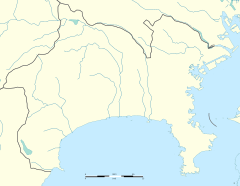Hayakawa Station
JT17 Hayakawa Station 早川駅 | |||||||||||
|---|---|---|---|---|---|---|---|---|---|---|---|
 Hayakawa Station building, 2022 | |||||||||||
| General information | |||||||||||
| Location | 1-16-1 Hayakawa, Odawara City, Kanagawa Prefecture 250-002 Japan | ||||||||||
| Coordinates | 35°14′21″N 139°08′43″E / 35.239085°N 139.145368°E | ||||||||||
| Operated by | |||||||||||
| Line(s) | JT Tōkaidō Line | ||||||||||
| Distance | 86.0 km (53.4 mi) from Tokyo. | ||||||||||
| Platforms | 1 island platform | ||||||||||
| Tracks | 2 | ||||||||||
| Connections | |||||||||||
| Construction | |||||||||||
| Structure type | At grade | ||||||||||
| Other information | |||||||||||
| Status | Staffed | ||||||||||
| Station code | JT17 | ||||||||||
| Website | Official website | ||||||||||
| History | |||||||||||
| Opened | 21 December 1922 | ||||||||||
| Passengers | |||||||||||
| FY2019 | 1,386 daily | ||||||||||
| Services | |||||||||||
| |||||||||||
| |||||||||||

Hayakawa Station (早川駅, Hayakawa-eki) is a passenger railway station located in the city of Odawara, Kanagawa Prefecture, Japan, operated by the East Japan Railway Company (JR East).
Lines
[edit]Hayakawa Station is served by the Tōkaidō Main Line, and is located 86.0 kilometers from the line’s terminus at Tokyo Station.
Station layout
[edit]The station consists of a single island platform, connected to the station building by a footbridge. The platform is too short to accommodate trains longer than 15 cars in length, so a door cut system is employed. The station is attended.
Platforms
[edit]| 1 | JT Tōkaidō Line | for Atami, Mishima, Numazu JT Itō Line for Itō |
| 2 | JT Tōkaidō Line・Ueno-Tokyo Line | for Odawara, Yokohama, Tokyo JU Utsunomiya Line for Utsunomiya and Kuroiso JU Takasaki Line for Takasaki and Maebashi |
Station history
[edit]Hayakawa Station first opened on December 21, 1922, when the section of the Atami-Odawara Line connecting Odawara with Manazuru was completed. From December 1, 1934 this became the Tōkaidō Main Line. Regularly scheduled freight services were discontinued in 1959, and parcel services by 1972. With the dissolution and privatization of the JNR on April 1, 1987, the station came under the control of the East Japan Railway Company. Automated turnstiles using the Suica IC Card system came into operation from November 18, 2001. The “Midori no Madoguchi” service counter was discontinued from 2007.[1]
Passenger statistics
[edit]In fiscal 2019, the station was used by an average of 1386 passengers daily.[2]
The passenger figures (boarding passengers only) for previous years are as shown below.
| Fiscal year | daily average |
|---|---|
| 2005 | 1,589[3] |
| 2010 | 1,440[4] |
| 2015 | 1,406[5] |
Surrounding area
[edit] National Route 135
National Route 135- Odawara City Hall Hayakawa Branch office
- Odawara fishing port
- Hayakawa Post Office
See also
[edit]References
[edit]- Yoshikawa, Fumio. Tokaido-sen 130-nen no ayumi. Grand-Prix Publishing (2002) ISBN 4-87687-234-1.(in Japanese)
External links
[edit]- Official home page.(in Japanese)
Notes
[edit]- ^ Japanese Wikipedia entry
- ^ 各駅の乗車人員 (2019年度) [Station passenger figures (Fiscal 2019)] (in Japanese). Japan: East Japan Railway Company. 2020. Retrieved 11 August 2020.
- ^ 神奈川県県勢要覧(平成18年度) [Kanagawa Prefecture official statistics (fiscal 2005)] (PDF) (in Japanese). Japan: Kanagawa Metropolitan Government. Retrieved 26 March 2021.
- ^ 神奈川県県勢要覧(平成23年度) [Kanagawa Prefecture official statistics (fiscal 2010)] (PDF) (in Japanese). Japan: Kanagawa Prefecture. Retrieved 26 March 2021.
- ^ 神奈川県県勢要覧(平成28年度 [Kanagawa Prefecture official statistics (fiscal 2010)] (PDF) (in Japanese). Japan: Kanagawa Prefecture. Archived from the original (PDF) on 1 August 2017. Retrieved 26 March 2021.



